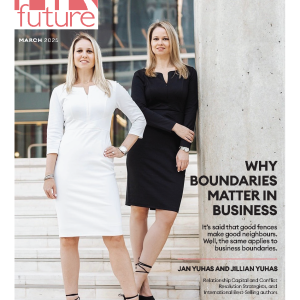DeRetta Rhodes shares her insights on leadership development and succession planning with Alan Hosking.
Why is leadership development so important?
When leaders get into a new role, we expect them to already know all that is required in that position, but often times they need augmentation around leading and developing. We need to be much more thoughtful of this, to provide leaders the opportunity to reach their optimal performance. We can provide leaders with different hats, coaching and assessment to understand their leadership style and what they must strengthen. That would allow them to become more rounded in their role, function and capabilities. HR has to be much more prescriptive in how this is done for leaders.
What do HR Directors need to know about succession and workforce planning?
Most organisations have been comfortable with us just doing replacement charts but, with succession planning, there are two components to look at – performance and potential. If you have a high performing individual, you need to consider their potential and ability to do the next two jobs. That forces HR practitioners to work with their leadership and think around what components to focus on.
As HR practitioners, we need to become much more prescriptive of our leaders, and put in place succession planning tools to support that process. This also requires a rigorous performance management process that also works in conjunction with the succession planning tool, for them to both assess and put plans in place for those leaders they are looking to build.
What mistakes do even the best HR Managers make in this area?
HR practitioners do not use this as a fluid tool. Once there is a succession plan in place, it is not the end of the story. We need to be nimble and flexible, always assessing, understanding and helping our leaders make those assessments as well. Changes occur that impact just succession planning, and they need to ensure the process is as agile as the organisation is.
Workforce planning is taking a view of the whole organisation, the entire employee lifecycle from recruiting, training, promotions to forecasting roles and so on. Workforce planning is not just succession planning. You can embed on top of it the organisational lifecycle. When forecasting new positions, how are you aligning that with job descriptions? How are you matching people, either externally or internally, with the strategic direction of the organisation? And once you have the right people, how do you make sure they are relevant and equipped to fulfil their roles?
HR needs to constantly scan the environment, not only externally, which is critical, but also internally. What are the demographics? What does your aging workforce look like? How are you building strength?
What tools does HR often underutilise?
Data analytics. There are systems to track promotions, turnover, forecasting, positions and so forth, but not many HR professionals use data analytics effectively or holistically. It can drive all human capital initiatives and will be a game changer for all of us in the HR profession.
What trends should HR prepare the organisation for?
Many trends are related to the changing profile of our employees. Five or ten years ago, mobile devices were not used like they are today. If you think of how many generations are sitting in your workforce, from Baby Boomers to Millennials, that makes a difference in how people work. We never had this span of generations before.
Any final words of advice?
Always, always, develop yourself. HR practitioners give so much to their organisations, providing great opportunities for staff and leaders to develop, but they do not do the same for themselves. We need to pour into ourselves, to be able to pour back into our organisations. The HR Strategy & Innovation Summit 2019 offered HR executives from across North America an intimate environment for a focused discussion of key new drivers shaping the future of HR. Hosted at the Château Élan Winery and Resort, Braselton, Georgia, on January 27 – 29, the Summit included presentations on agility in HR, predictive workforce analytics, winning approaches for engaging employees, workforce planning, and the art and science of building and transforming culture.
Profile
DeRetta Rhodes was recently appointed Senior Vice President of Human Resources, Atlanta Braves. Previously she was the Chief Human Resources Officer of YMCA of Metro Atlanta in the US, and prior to that the VP Human Resources, Financial Services, at First Data Corporation and VP, Human Resources at Turner Broadcasting. Rhodes was the Chairperson at the marcus evans HR Strategy and Innovation Summit 2019, which took place in Braselton, Georgia, from January 27 – 29.















































































